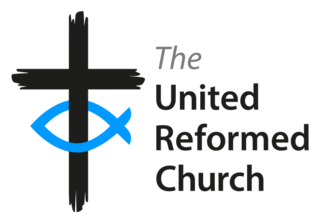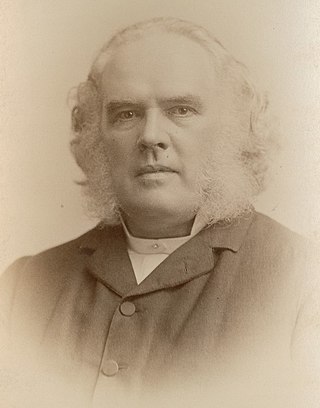Related Research Articles

Presbyterianism is a part of the Reformed (Calvinist) tradition within Protestantism that broke from the Roman Catholic Church. Presbyterian churches derive their name from the presbyterian form of church government by representative assemblies of elders. Many Reformed churches are organised this way, but the word Presbyterian, when capitalized, is often applied to churches that trace their roots to the Church of Scotland or to English Dissenter groups that formed during the English Civil War.

The United Reformed Church (URC) is a Protestant Christian church in the United Kingdom. As of 2022 it had approximately 40,000 members in 1,284 congregations with 334 stipendiary ministers.

Congregational churches are Protestant churches in the Reformed (Calvinist) tradition practicing congregationalist church governance, in which each congregation independently and autonomously runs its own affairs.

The Uniting Church in Australia (UCA) was founded on 22 June 1977, when most congregations of the Methodist Church of Australasia, about two-thirds of the Presbyterian Church of Australia and almost all the churches of the Congregational Union of Australia united under the Basis of Union. According to the church, it had 243,000 members in 2018. In the 2016 census, about 870,200 Australians identified with the church; in the 2011 census, the figure was 1,065,796. The UCA is Australia's third-largest Christian denomination, behind the Catholic and the Anglican Churches. There are around 2,000 UCA congregations, and 2001 National Church Life Survey (NCLS) research indicated that average weekly attendance was about 10 per cent of census figures.

The Church of South India (CSI) is a united Protestant Church in India. It is the result of union of a number of Protestant denominations in South India that occurred after the independence of India.
The Congregational Christian Churches were a Protestant Christian denomination that operated in the U.S. from 1931 through 1957. On the latter date, most of its churches joined the Evangelical and Reformed Church in a merger to become the United Church of Christ. Others created the National Association of Congregational Christian Churches or joined the Conservative Congregational Christian Conference that formed earlier in 1945. During the forementioned period, its churches were organized nationally into a General Council, with parallel state conferences, sectional associations, and missionary instrumentalities. Congregations, however, retained their local autonomy and these groups were legally separate from the congregations.
The World Alliance of Reformed Churches (WARC) was a fellowship of more than 200 churches with roots in the 16th century Reformation, and particularly in the theology of John Calvin. Its headquarters was in Geneva, Switzerland. They merged with the Reformed Ecumenical Council in 2010 to form the World Communion of Reformed Churches.

Alexander Mackennal was a British Nonconformist minister.
Churches Together in Britain and Ireland (CTBI) is an ecumenical organisation. The members include most of the major churches in England, Scotland, Wales and Ireland. CTBI is registered at Companies House with number 05661787. Its office is in Central London. As of 2022 the General Secretary is Nicola Brady, who succeeded Bob Fyffe.
Free Church Federation is a voluntary association of British Nonconformist churches for cooperation in religious social work. It was the outcome of a unifying tendency displayed during the latter part of the 19th century.

The Congregational Federation is a small Christian denomination in Great Britain comprising 235 congregations, down from 294 in April 2014. The Federation brings together Congregational churches, and provides support and guidance to member churches both financially and otherwise.

The World Communion of Reformed Churches (WCRC) is the largest association of Reformed (Calvinist) churches in the world. It has 230 member denominations in 108 countries, together claiming an estimated 80 million people, thus being the fourth-largest Christian communion in the world after the Catholic Church, Eastern Orthodox Church, and the Anglican Communion. This ecumenical Christian body was formed in June 2010 by the union of the World Alliance of Reformed Churches (WARC) and the Reformed Ecumenical Council (REC).
The Congregational Union of England and Wales brought together churches in England and Wales in the Congregational tradition between 1831 and 1966.
Douglas Horton was an American Protestant clergyman and academic leader who was noted for his work in ecumenical relations among major Protestant bodies of his day. In his roles as a denominational executive, international ecclesiastical figure, and academic leader, Horton strongly advocated efforts undertaken by churches to unite organizationally with each other, even those of unlike theological and governmental persuasion.
The Plan of Union of 1801 was an agreement between the Congregational churches of New England and the Presbyterian Church in the United States of America for mutual support and joint effort in evangelizing the American frontier. It lasted until 1852.

Llewelyn David Bevan was a Congregational church minister and academic active in Australia.
The United Church of Northern India (UCNI) is a mainline Presbyterian Church society in India belonging to the Protestant Christian denomination. The UCNI was constituted by the union of the Presbyterian Church and Congregational churches in 1924. Since then Congregational churches have been admitted to membership by the Church Courts competent to admit them. UCNI administers its affairs through local churches, Church councils, synods and a General Assembly. The registration numbers used are approved by the UCNI.

Congregationalism in the United States consists of Protestant churches in the Reformed tradition that have a congregational form of church government and trace their origins mainly to Puritan settlers of colonial New England. Congregational churches in other parts of the world are often related to these in the United States due to American missionary activities.
References
- ↑ The International Congregational Council, London, 1891, Authorised Record of Proceedings London: J. Clarke and Co., 1891 2d ed. pp.xxiii-xxiv, 13, 307
- ↑ Eugene Webster ed. Volume of proceedings of the second International Congregational Council, held in Tremont Temple, Mass., September 20–29, 1899 Boston : S. Usher 1900
- ↑ John Brown ed. Volume of proceedings of the third International Congregational Council: held in the United Free Church Assembly Hall, Edinburgh, June 30 - July 9, 1908 London : Congregational Union of England and Wales, 1908
- ↑ International Congregational council. 4th, Boston, 1920 Official Boston book of the International council of Congregational churches, June 29-July 6, 1920 Boston, The Pilgrim press 1920
- ↑ Proceedings of the Fifth International Congregational Council, Bournemouth, July 1st-8th, 1930 : the general subject being the living church London : Congregational Union of England and Wales, 1930
- ↑ Proceedings of the Sixth International Congregational Council, Wellesley College, Wellesley, Mass., U.S.A., June 17th-24th, 1949. Boston, Pilgrim Press, 1949
- ↑ Proceedings of the seventh International Congregational Council, St. Andrews University, Scotland, 20-29th June, 1953. Pilgrim Press; Independent Press, 1953
- ↑ Proceedings of the eighth Assembly of the International Congregational Council, Hartford, Conn., U.S.A. 2–10 July 1958 : theme: God speaks to our world. London : Independent Press, 1958
- ↑ Proceedings of the 9th International Congregational Council, Rotterdam, The Netherlands, 4–12 July 1962 : theme: Essentials of Faith London, 1962
- ↑ Proceedings of the tenth assembly of the International Congregational Council, Swansea, South Wales, 7–11 July 1966. Theme: A reformed church in a new age; reformed faith and Congregational churchmanship in an ecumenical era. London, Independent Press 1966
- ↑ Proceedings of the Uniting General Council of the World Alliance of Reformed Churches (Presbyterian and Congregational) held at Nairobi, Kenya, August 20–30, 1970. Geneva : The Alliance, 1970